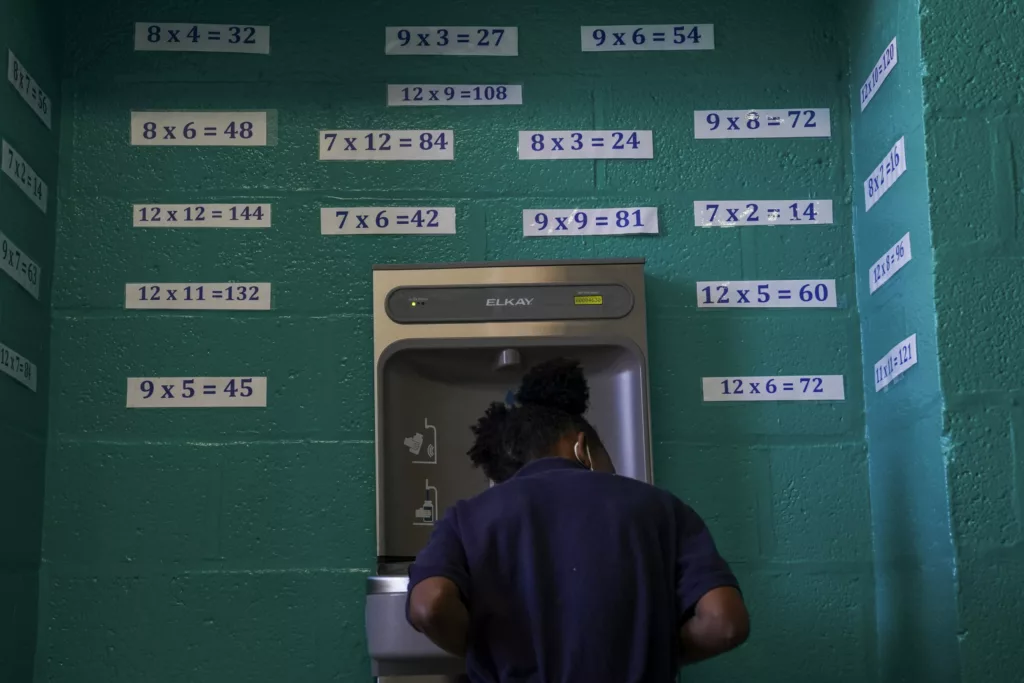[ad_1]

Get important education news and analysis delivered straight to your inbox
When I’m running workshops for school leaders, one of my favorite opening questions to ask is: “How many of you would say that you are math people?”
Typically, a few hands go up. I often see the same thing when working among teachers — the small shrug as they admit, “I’m just not a math person.”
Many brilliant, hard-working educators I work with simply don’t feel confident in their math skills, and thus their ability to teach math to others. On the other end of the spectrum, math teachers that have had a smooth and easy experience with the subject find it hard to tap into why some students struggle.
As the education field faces the challenge reflected in the latest dip in NAEP scores, we are reaching for tools and strategies such as high-dosage tutoring, extended learning time, personalized learning and more.
What math educators and leaders need to remember is that this “dip” is not new that the “new” strategies being implemented have already been tried in classrooms across the U.S.; the NAEP data shows that they have not had the intended impact. Where we need to focus is on the mindsets and dispositions foundational to the teaching and learning of mathematics.
For too long, students (and adults) have been fed the narrative that they are just not good at math.
This moment is not just about catching students up, but about helping kids create a healthy sense of confidence in their own math abilities. For too long, students (and adults) have been fed the narrative that they are just not good at math. Instead, we need students to see themselves as mathematicians and to recognize math in the world all around them.
We can’t do any of that if we as educators have not thoroughly examined our own “math identities” and the ways that we project our own math beliefs through the instructional decisions we make.
This is especially true when serving students of color who may be more likely to internalize society’s messages that math is not for them.
Related: Inside the new middle school math crisis
Teacher preparation programs have a responsibility to teach teachers not just the mechanics and concepts of math, but how to create confidence, curiosity and joy in math spaces.
It’s time for “I’m just not a math person” to sound as silly as “I’m just not a reading person.”
At Relay Graduate School of Education, we support teachers in learning to ensure that they build on the best practices and affirm students as mathematicians. Here’s how:
- Explore “math identities.” Teachers bring the history of their own educational experiences into the classrooms they create. These histories should be explored as they inevitably inform the beliefs and instructional decisions teachers make — from the curricular materials they place in front of students, to the routines they implement and even who they call on during whole-group discussions. Our math experiences may have been affirming, traumatic or a little bit of both, but to ensure we are making instructional decisions that are affirming of students we need to monitor how our own math beliefs show up in our teaching.
- Embed discussions of bias into content training. In the beginning of my career as a math teacher, my principal pointed out that I was calling on more boys than girls in class. In doing this, I was unconsciously replicating a bias I had internalized : that male voices matter in math spaces more than female voices. Recognizing that I, a female mathematician, could perpetuate this pattern ignited my fire. The fact is that we all carry unconscious bias based on identity markers or content confidence, and we need the space to reflect on that bias and think about how to create vibrant and inclusive classrooms. This is true for every subject area.
- Make math relevant to students’ lives. Math is present in every aspect of our lives — and not just in obvious areas like cooking ratios and personal budgeting. Every day, we all make deductions, inferences and estimates — these are all forms of mathematical thinking. When we help students build their math identities, we must also help them see all that math has to offer and how they already use it in their daily lives.
- Explore teaching strategies that promote positive math identities. We must foster teaching strategies that encourage students to see themselves as unique mathematicians. In order to do this, we need to recognize that math is something that can be messy, slow and personal — not a timed race to the right answer using a single, approved technique — and therefore that our teaching techniques must be personalized. Teachers need to learn to use teaching strategies that prioritize discussion, such as mathematical language routines and the five practices for mathematical discourse, and how to engage students in sense-making through structured inquiry and mathematical modeling.
If we prioritize the above policies in teacher prep math curriculums, we’ll establish a more equitable math space for all.
Kimberly Melgar is department chair for mathematics at Relay Graduate School of Education. She taught middle school math and science and served as an instructional coach in the South Bronx before joining Relay, where she has taught aspiring teachers as an adjunct and assistant professor.
This story about math identities was produced by The Hechinger Report, a nonprofit, independent news organization focused on inequality and innovation in education. Sign up for Hechinger’s newsletter.
[ad_2]
Source link
Meet Our Successful Graduates: Learn how our courses have propelled graduates into rewarding
careers. Explore their success stories here!
Discover More About Your Future: Interested in advancing your teaching career? Explore our
IPGCE, MA, and QTS courses today!

Explore Our Courses: Ready to take the next
step in your education journey? View our
comprehensive course offerings now!

